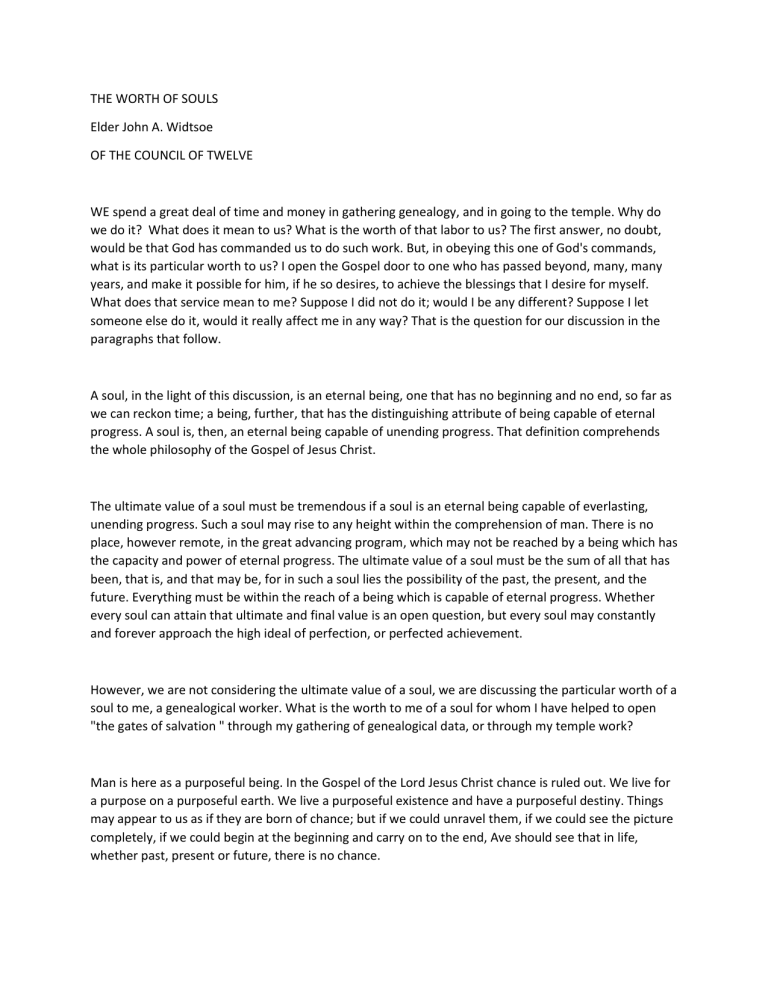MILLENNIAL STAR - No 9 Vol 96 Thursday March 1 1934 - THE WORTH OF SOULS

THE WORTH OF SOULS
Elder John A. Widtsoe
OF THE COUNCIL OF TWELVE
WE spend a great deal of time and money in gathering genealogy, and in going to the temple. Why do we do it? What does it mean to us? What is the worth of that labor to us? The first answer, no doubt, would be that God has commanded us to do such work. But, in obeying this one of God's commands, what is its particular worth to us? I open the Gospel door to one who has passed beyond, many, many years, and make it possible for him, if he so desires, to achieve the blessings that I desire for myself.
What does that service mean to me? Suppose I did not do it; would I be any different? Suppose I let someone else do it, would it really affect me in any way? That is the question for our discussion in the paragraphs that follow.
A soul, in the light of this discussion, is an eternal being, one that has no beginning and no end, so far as we can reckon time; a being, further, that has the distinguishing attribute of being capable of eternal progress. A soul is, then, an eternal being capable of unending progress. That definition comprehends the whole philosophy of the Gospel of Jesus Christ.
The ultimate value of a soul must be tremendous if a soul is an eternal being capable of everlasting, unending progress. Such a soul may rise to any height within the comprehension of man. There is no place, however remote, in the great advancing program, which may not be reached by a being which has the capacity and power of eternal progress. The ultimate value of a soul must be the sum of all that has been, that is, and that may be, for in such a soul lies the possibility of the past, the present, and the future. Everything must be within the reach of a being which is capable of eternal progress. Whether every soul can attain that ultimate and final value is an open question, but every soul may constantly and forever approach the high ideal of perfection, or perfected achievement.
However, we are not considering the ultimate value of a soul, we are discussing the particular worth of a soul to me, a genealogical worker. What is the worth to me of a soul for whom I have helped to open
"the gates of salvation " through my gathering of genealogical data, or through my temple work?
Man is here as a purposeful being. In the Gospel of the Lord Jesus Christ chance is ruled out. We live for a purpose on a purposeful earth. We live a purposeful existence and have a purposeful destiny. Things may appear to us as if they are born of chance; but if we could unravel them, if we could see the picture completely, if we could begin at the beginning and carry on to the end, Ave should see that in life, whether past, present or future, there is no chance.
Earth and man come under one great pervading purpose, to which we must all bow and give our allegiance. Whether in this life or in the life to come.
God had a purpose in placing us upon earth. We are eternal souls, with the inherent power to progress, placed on earth for the purpose of learning better how to go forward under the law of progression, stepping on from one estate to another estate, preparing ourselves for still another estate, all in the line of advancement. The result of such progression, the final purpose of life, has been clearly and definitely stated by the Prophet Lehi: “Men are, that they might have joy.”
God's intent is to surround His children upon earth with the possibilities of joy. And joy can be won in only one way — the joy of which the prophet Lehi speaks, through the definite principle of eternal progress. There can be no joy for a person who stands still; to him, that which seems joy is merely a make-belief, the shell, not the kernel. It is but the savory smell, not the feast itself.
The purpose of life on earth is that man might progress. The plan of salvation provides that every man shall have the opportunity for eternal progress, or advancement. The door must not be shut upon any persons. All humanity must have opportunities for salvation. Salvation must be universal. There is no end to God's mercy. There is no end to God's hope for His children. There is no end to His determination to bring us under the law, to achieve the sublime purpose stated by father Lehi. ''Men are, that they might have joy" — the joy which accompanies progress, advancement and constantly increasing attainment.
In the universe of living, intelligent beings, there are many gradations. Some are perfected — we call them gods. God, the Father of all, is beyond our full comprehension in His attributes. No man can comprehend infinity. There are other living beings, here and elsewhere, of lesser and varying intelligence and achievements, all moving forward, upward, to the high destiny of all sentient beings.
It is self-evident that those who are lower down in the scale of progression do not know as much as those who are superior in experience, and therefore need help from those further advanced. We need ask and receive help from our Heavenly Father. Every man has need of the guidance that comes from a greater intelligence. Therefore, we have a plan of salvation.
While man has need of help from above, he also has a wondrous power within himself. The Lord may offer the best help, as indeed He has, for man's advancement, joy and progress, but man himself must exercise the power within him to accept or to reject that which is offered him. The Lord does not save men without some effort on their part.
The Lord provides the plan of salvation; He holds out His hands and points the way; but man must do his part; he must accept or reject, use or neglect the offerings. In a certain large way, we may say that man saves himself by acceptance of truth and by obedience to that which God requires of him.
In our pre-existent state, in the day of the great council, held before the foundation of the earth was laid, we made a certain agreement with the Almighty. The Lord proposed a plan, conceived by Him. We accepted it. Since the plan is intended for all men, we became parties to the salvation of every person under that plan. We agreed, right then and there, to be not only saviors for ourselves, but measurably, saviors for the whole human family. We went into a partnership with the Lord. The working out of the plan became then not merely the Father's work, and the Savior’s work, but also our work. The least of us, the humblest, is in partnership with the Almighty in achieving the purpose of the eternal plan of salvation.
That places a very responsible attitude towards the human race. By that doctrine, with the Lord at the head, we become saviors on Mount Zion, all committed to the great plan of offering salvation to the untold numbers of spirits. To do this is the Lord's self-imposed duty, this great labor His highest glory.
Likewise, it is man's duty, self-imposed, his pleasure and joy, his Labor, and ultimately his glory.
There is no place for forgetting the other man in the Gospel of the Lord Jesus Christ. There stands my brother. It was for him that the whole plan was made, for him the Church was organized, for him all these blessings were given — not for me alone. Oh, I stand there too. The Church was made for me, the
Gospel was given for me, all the blessings were given for me; but my brother is entitled to them just as much as I am. He and I together and all of us must unitedly work together to fulfill the great purposes of the Almighty Father.
UNDER the Gospel what is man's highest ideal? Under the Gospel it must be to become like the Father.
If the Lord's concern is chiefly to bring happiness and joy, salvation to the whole human family, we cannot become like the Father unless we too engage in that work. There is no chance for the narrow, selfish, introspective man in the kingdom of God. He may survive in the world of men; he may win fame, fortune and power before men, but he will not stand high before the Lord unless he learns to do the works of God. which always point toward the salvation of the whole human family.
What is the foundation of Gods' work, according to the principles which we have here discussed? Why did God provide a plan for the salvation of the whole human family? Why did He not choose for high advancement, a few, the kindest, the most forward-looking, the most obedient of His children?
Every Latter-day Saint can answer. Because God possesses the principle of love — the most wonderful, the most magnificent, the most sublime, the most tremendous in power of all principles known to man
— which lies at the very foundation of God's work in behalf of the human family. He prepared His plan, devised it out of His divine intelligence, laid it before His children, because of the love He had and has for His children. Love is born out of sacrifice, that is why there was a great battle in the heavens between Lucifer and the Father's representative. There can be no real love, living, active, useful love, love that has market value in the heavens above, unless that love is born and nurtured by sacrifice. Has the Lord sacrificed for us? I need not answer that question. Did the Savior sacrifice for us? That needs no answer. Would a cold, lifeless God. out in distant space, planning a great mathematical plan, and doing nothing else — would He, could He display real love? But a Father, with a father's love, would give of
Himself for His children. The Firstborn of our heavenly family proved His love by a sacrifice that no other living being upon the face of the earth can approach. The foundation of this work is love, born and nurtured and developed in sacrifice. The worth of a soul now becomes great to me. I go into the temple, and give a half day to opening the doors of salvation for a dead person; or I spend many precious hours searching for, planning, gathering genealogy in order that he and his brothers — my brothers — may have those saving ordinances done for them by my fellow -workers who have access to the Temples of the Lord. I only know him by name, and never shall know him nearer on this earth; but out of my own understanding love of the cause, no matter how humble it may be, and out of my willingness to sacrifice to prove that love, I take a step toward the likeness of ray Father in heaven. It is a tremendous thing — this soul for whom I labor. Without that soul I might not find the same opportunity of approaching the likeness of my Father. That soul is of immense worth to me.
"Remember," says the Lord, "the worth of souls is great in the sight of God. For, behold, the Lord your
Redeemer suffered death in the flesh: wherefore he suffered the pain of all men, that all men might repent and come unto him."
All have to face death. Many men have been crucified to death. But only one has been crucified who suffered the death of the whole race in his own death, who felt the weight of all the sins of all men, because He had to redeem humanity through His death. A precious gift was Christ's life; given that we might win salvation.
The worth of souls, from Christ's service, must be very, very great. He undertook the leadership of the plan, with all of its difficulties and terrors, and we, if we desire to approach the Christ-like life, must be willing to do, in our small, humble way, for our brethren and sisters, living and dead, just what He did for us. The privilege of sacrificing for our brethren, living and dead, makes the worth of souls seem very great.
THE Lord said to Moses: " This is my work and my glory — to bring to pass the immortality and the eternal life of man." A soul must be tremendously valuable in the sight of the Father, if His work and His glory consist in bringing salvation to souls. Again I say to you, out of the feelings of my heart, that never will the love of God grow cold toward His children. If we open the doors, if we do the earth work for those who have gone before, then I believe that through the eternities to come, the Lord will continue
to wrestle with His wayward, disobedient, unwilling children, until He brings back all who will come. The
Prophet Joseph Smith, sweeping eternity with his prophetic vision said, "There is never a time when the spirit is too old to approach God. All are within the reach of pardoning mercy who have not committed the unpardonable sin."
" This is my work and my glory — to bring to pass the immortality and eternal life of man." To realize our highest ideal, then, to be like our Father, we must do as He has done. Our work must be to bring to pass the happiness of mankind, and our glory will be won thereby. To imitate Christ, to win the blessings that follow love and sacrifice, we must render service to our fellow men, living and dead. A soul becomes of indescribable value, since it offers a means of service by which we ourselves may rise to the position and power of godhood.
How shall I realize this high ideal? It may be done in part by serving the dead, though not forgetting the living I would not place the dead in advance of the living except as the dead are very helpless in these earth ordinances. A few years ago, I went to Europe with rather a handful of names of my ancestors. But
I wanted joy and glory of further service. I wanted to be a little more like my Father. So I began to look around for more genealogical information. It cost money and time. The Lord blessed me, gave me a great many more than I thought I could possibly gather, thousands of them, if I had only found a few, the fact that I did all I could entitled me to the joy of one who tries to help onward the cause of the Lord.
If I had found none, I might yet have Avon joy by doing service for someone not of my blood. Since a soul is so valuable for me to accomplish my own high destiny, it does not matter so much, when I run out of names that belong to my own family, whose names I take. My first obligation is to my own, but my ultimate obligation is to the human race. If every person will take care of his own family, of course, in time the whole human race will be looked after.
In our work of gathering genealogy, doing our temple work, sealing the dead who have been endowed, that is, finishing the work as far as we can here upon this earth by opening the doors of salvation for those who have gone before — Ave realize measurably the high ideal which should rest in the bosom of every Latter-day Saint.
The worth of a soul can best be measured in its effect upon man's realization of his highest ideal. without my brother I cannot attain my highest. Without loving him I cannot look forward to the highest place. Without sacrificing for him I cannot hope to win the fullest recognition. Without him I cannot achieve my likeness to the Lord. We are bound together, one great human family, moving on to a glorious destiny. —
(Adapted from a synopsis of a Genealogical Class exercise, appearing in the Deseret News, January 20th,
1934.)







